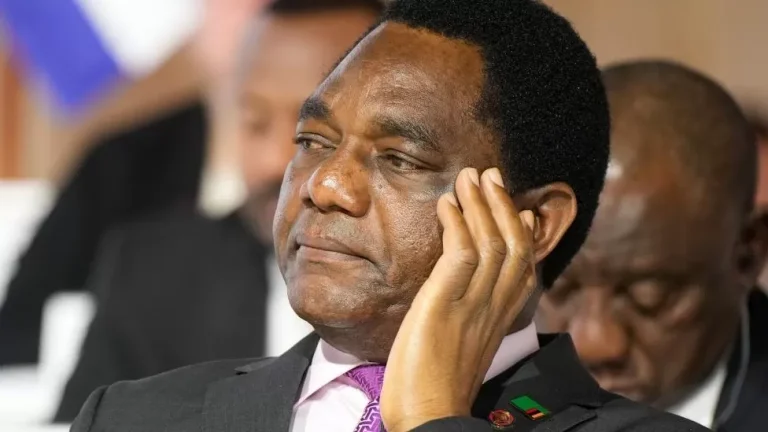U.S. Issues Warning Over Zambia’s New Cybersecurity Law Amid Surveillance Concerns
Edited by : Widad WAHBI
The United States has issued a formal warning to its citizens regarding a new cybersecurity law in Zambia, raising serious concerns over privacy, surveillance, and freedom of expression. According to a notice released by the U.S. Embassy in Lusaka, the legislation—quietly signed into law on April 8 by President Hakainde Hichilema—grants Zambian authorities the power to monitor and intercept all digital communications within the country, including calls, emails, text messages, and streaming content.
The embassy warned that the law defines “sensitive information” so broadly that it could apply to nearly any form of digital communication, placing not just political dissidents but all residents—Zambians and foreigners alike—under potential scrutiny. The message urged Americans living in or traveling to Zambia to “carefully assess the implications of this law and adapt accordingly.”
In its response, the Zambian Ministry of Foreign Affairs insisted the law is not designed to infringe on privacy, and that any surveillance measures require a court order. Officials stated that the purpose of the law is to combat cyber fraud, online child exploitation, and misinformation, emphasizing that mass surveillance is neither authorized nor intended.
Despite these assurances, many Zambians remain unconvinced. The sudden establishment of a cybersecurity unit within the president’s office and the absence of public consultation have amplified suspicions that the law could be used to target critics of the government, especially ahead of the upcoming general elections.
Free press advocate Joan Chirwa described the law as “a sad day for Zambia,” warning that its reach goes far beyond journalists and activists. “It will affect everyone,” she said, citing fears that the government is edging closer to digital authoritarianism.
The law gives broad enforcement powers to authorities, allowing them—under a search warrant—to enter any premises and seize computers or systems believed to contain criminal evidence or content obtained illegally. It also empowers the government to extradite Zambians accused of offenses under the law. Depending on the offense, penalties include fines or imprisonment ranging from five to fifteen years. Telecommunication and IT companies are now legally required to proactively intercept all digital communications.
For many Zambians, the law’s enactment was a shock. It was not publicly debated, and the first many heard of it was through the American embassy’s Facebook alert. The move is especially controversial given President Hichilema’s own past opposition to similar legislation. In 2021, while still in the opposition, he denounced a draft cyber law proposed by the previous administration, calling it a tool to stifle free speech and spy on citizens.
Opposition MP Miles Sampa openly criticized the president’s U-turn, asking in a viral Facebook post: “When did you change your position to now sign a law that bans nearly 100% of our ability to express ourselves online, without risking 25 years or even life in prison?” He continued, “With this new law, Mr. President, you might as well sign a state of emergency and suspend democracy altogether.”
Although the U.S. and Zambia have generally enjoyed warm relations under Hichilema’s leadership, the embassy’s warning reveals a growing unease. The American ambassador had recently voiced concerns over corruption within the Zambian government—a shift from earlier support. Now, Washington appears to be signaling that the country’s democratic trajectory is at risk, especially if the law is used to suppress dissent or undermine electoral transparency.
As Zambia heads toward a critical election year, the new cybersecurity law has become a lightning rod for political debate, civic anxiety, and international scrutiny—highlighting the fragile balance between digital security and civil liberties in an era of rising global surveillance.
-

Cyber Peacekeeping: A New Frontier for International Conflict Prevention
Edited By: Noor Al MazroueiCyberspace has grown fast and has changed the face of international security. It has opened new... Security trends -

South Africa Pursues Global Trade Partnerships as U.S. Tariffs Threaten Economy
Edited By: Tendai ZolaSouth African economists and officials are calling for enhanced global cooperation as the country grapples with the... Economy -

Horn of Africa: When a Hack Pulls Back the Curtain on Blood Ivory Finances
Edited By: AfricaEyeWhat began as a routine cyber-security probe has turned into a revelation with global implications. Investigators uncovered a... East Africa - Horn of Africa -

South Africa court halts TotalEnergies offshore drilling project
Edited By: Omar Kadir THE South African High Court has overturned government approval for a major offshore oil drilling project by... Economy -

South Africa Slams US Human Rights Report as “Deeply Flawed”
Edited By: Widad WAHBI The South African government has sharply criticized a recent US State Department report, calling it “inaccurate and... International Diplomacy -

Voices of Gullah: Keeping the Songs of Enslaved Ancestors Alive
Edited By : Widad WAHBI On St. Helena Island, South Carolina, a small group of singers aged between 70 and 90... Culture

 Follow the latest news on WhatsApp
Follow the latest news on WhatsApp  Follow the latest news on Telegram
Follow the latest news on Telegram  Follow the latest news on Google News
Follow the latest news on Google News  Follow the latest news on Nabd
Follow the latest news on Nabd 


















